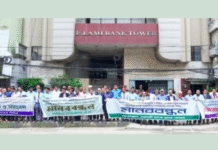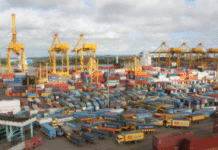
Bangladesh Ambassdor and PR at ESCAP making statement during adoption of Bangladesh Resolution on Oceans and Seas
The heads of governments and other high-level officials of the Asia and the Pacific region have unanimously adopted a resolution on blue economy placed by Bangladesh.
Bangladesh embassy in Bangkok termed it “historic” and said the resolution was adopted at the end of the five-day 72nd session of the United Nations Economic and Social Commission for Asia and the Pacific (ESCAP) on Thursday.
The resolution, in line with the new SDGs goal 14, stressed on conservation and sustainable use of the oceans, seas and marine resources for sustainable development in Asia and the Pacific.
Bangladesh started pursuing blue economy as a diplomatic priority after it settled its maritime boundary disputes with neighbours India and Myanmar.
Dhaka also hosted an international workshop on blue economy in Sep 2014 which was regarded as the “visionary initiative” of Prime Minister Sheikh Hasina in the resolution text.
The resolution will help Asia and Pacific states, especially Small Island Developing States, LDCs, low lying coastal States and also Landlocked Developing Countries of the region to address their sustainable development challenges, the embassy said.
High level representatives and delegates of 53 countries participated in the debates and reviewed key challenges to achieving inclusive and sustainable economic and social development in the Asia Pacific region.
The resolution titled “Regional cooperation in Asia and the Pacific to promote the conservation and sustainable use of the oceans, seas and marine resources for sustainable development” (E/ESCAP/72/L.12/rev1), was adopted after several rounds of intense negotiations.

Bangladesh Ambassdor and PR at ESCAP making statement during adoption of Bangladesh Resolution on Oceans and Seas
Australia, India and Sri Lanka co-sponsored it and spoke in favour of Bangladesh’s proposal.
“In keeping with Prime Minister Sheikh Hasina’s leadership role in promoting the Blue Economy concept, we took the initiative to table for the first time in UNESCAP, a resolution linked to Sustainable Development Goal 14 and our national aspirations to conserve and use marine resources at the Bay of Bengal sustainably”, Saida Muna Tasneem, Bangladesh Ambassador to Thailand and Permanent Representative to the UNESCAP told the organisation during the debate.
Meanwhile, the Bangladesh embassy organised a high level meeting on financial inclusion for LDCs in Asia and the Pacific on the sidelines of the 72nd session.
The Minister of Finance and Economic Development of Kiribati, ESCAP Executive Secretary, Deputy Governor of Bangladesh Bank, Deputy Governor of the National Bank of Cambodia, experts from Australia and the private sector participated as panellists at the event.
Bangladesh was “highly praised” at the event for the initiatives and successes in ensuring financial inclusion of the disadvantaged segments of society, the embassy said.
Source: Bd news24









